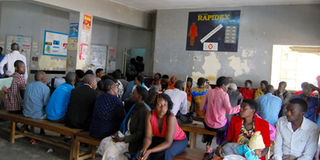Invest more in preventive healthcare, govt told

Treatment. Patients seek treatment at Mbarara Regional Referral Hospital on Tuesday. PHOTO BY FELIX AINEBYOONA
What you need to know:
- Argument. NMS official says once diseases are prevented, there will be less demand for medicines and expenditure on treatment will reduce.
MBARARA.
The government should focus more on promoting preventive healthcare services to reduce expenditure on drugs for diseases that are preventable, a National Medical Stores (NMS) official has said.
Mr Apollo Newton Mwesigye, the NMS corporation secretary, recently said many of the drugs the country buys are for treating preventable diseases.
These, among others include malaria, HIV, cholera, dysentery, measles, typhoid, diarrhoea, genital ulcers, urethra discharge, urinary tract infections, brucellosis and intestinal worms.
“Although our duty as NMS is to distribute medicines, we have noticed that government is spending more money on medicines instead of concentrating on preventive healthcare because we believe that if we prevent diseases then we will be able to spend less on medicines. Health professionals tell us that about 75 per cent of diseases treated in the hospitals are preventable,’’ said Mr Mwesigye.
He made the remarks during the installation of Mbarara Rotary Club president recently. The money spent on buying drugs to treat such diseases, Mr Mwesigye said, would be used for other important development programmes.
“Diseases such as malaria, cholera, HIV, plus accidents are preventable. If we concentrate on preventive healthcare then we will be able to spend less on medicines. The message we are sending out is let people prevent diseases instead of going to look for money to treat them,” he said.
Mr Mwesigye said government has in the 2017/2018 financial year budgeted Shs237b for purchasing medicines, adding that the country acquired drugs worth Shs800b, including what came from development partners, in the current financial year.
“That is a lot of money, so we are saying if we prevented most of the diseases, we might not use all this money to buy medicines. When you are taking medicine, yes you are curing yourself but you are actually taking poison because medicine is poison; that is why it has short life. Let us do things which will stop the diseases such that we spend less on the medicine,” he explained.
The Mbarara Regional Referral Hospital director, Dr Celestine Barigye, said on Tuesday that in the current financial year, they have handled 7,252 cases of malaria, dysentery (93), measles (17), typhoid (188), diarrhoea (864), genital ulcers (345), urethra discharge (530), sexually transmitted diseases (797), urinary tract infections (1,089), brucellosis (130), intestinal worms (321), drug abuse (68), and alcoholism (95).
The diseases are preventable yet they expose the country to high expenditure on medicines.
The president of the Rotary Club of Mbarara, Mr Allan Asingwire, said they plan to write a proposal to the government so that they can be funded to carry out community sensitisation on preventing diseases.
The diseases that are largely difficult to prevent or complicated diseases that need special attention handled at the hospital this year include: heart diseases (9,133 cases), cancer (860), leprosy (19), asthma (342), childhood mental disorders (31), sickle cell anaemia (22), oral cancers (24), epilepsy (1,485), cataracts (308), pneumonia (5,025) and meningitis (94).
Patients
The referral hospital serves a population of about 4 million people in the district of Mbarara, Ibanda, Kiruhura, Isingiro, Ntungamo, Sheema, Bushenyi, Buhweju, Rubirizi and Mitooma. In the current financial year, the hospital registered 28,000 inpatients and 120,000 outpatients.




